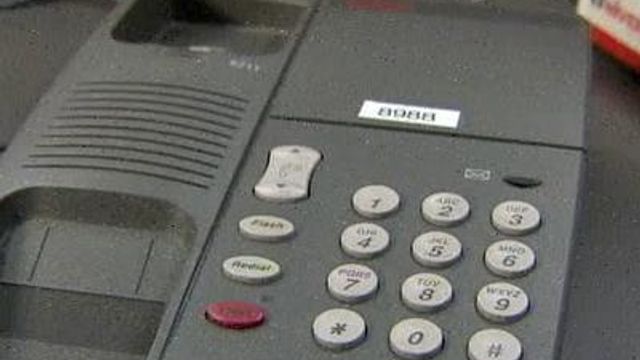Local News
FBI warns of phone scam
The Federal Bureau of Investigation is warning people of a scam in which the victim’s telephone number is changed as a way to isolate them.
Posted — UpdatedRALEIGH, N.C. — The Federal Bureau of Investigation is warning people of a scam in which the victim’s telephone number is changed as a way to isolate them.
The scam begins with a person calling in regard to a big prize, FBI agents said. The scammer then gets identity information, such as the last four-digits of the person’s Social Security number. Victims are usually asked to wire money before they can receive the prize.
Scammers contact the phone company, posing as the victim, and ask to change the phone number because of nuisance calls. The scammers provide the last four-digits of the Social Security number as a verification of identity, and the number gets changed.
Sally, who would not give her real name, said her 75-year-old mother fell victim to the scam.
“It's a scary thought that your parent has been taken and used and you know how hard they have worked their whole life to earn that money,” Sally said.
After Sally’s mother wired the first round of money, other people called her posing as government agents, even giving fake badge numbers.
“There were IRS agents calling her, lawyers calling, FBI agents calling,” Sally said.
Scammers wanted her to wire more money out of the country. Sally said her mother sent thousands of dollars to the scammers and, because it was wired out of the country, it is untraceable.
Scammers then changed Sally’s mother’s phone number, so the only people she could speak with were them because only they knew the new number.
“I called the number and they told me it had been disconnected,” Sally said. She was only out of touch with her mother for a day before finding out what happened.
“The scammers are changing the numbers to isolate the victim,” FBI Special Agent Joan Fleming said.
Fleming said she has heard of threats of bodily harm in a similar scamming case in Chapel Hill.
No special agent, government or bank official would ever call a person asking for money to be wired, Fleming said.
Sally wants people to keep an eye on their families. She is also concerned her mother could fall victim again.
“She will tell you that she understands and she is not going to do it again, but depending on who calls that afternoon, they may have her talked into sending more money by that afternoon,” Sally said.
The FBI said there are warning signs to look for with family members:
- Excessive mail – a compulsion to answer sweepstakes or charity and contest mailings
- Excessive calls – a compulsion to answer un-ending calls, or reluctance to answer because they’ve already been harassed by 50 earlier calls that day
- Unusual financial transactions – wiring, when wiring is something the person has never done, a large amount of money
- Preoccupation with Fed Ex or UPS or other shipping companies, – waiting for money or a package
- Generally secretive nature – many scammers ask victims to keep the winnings to themselves and not tell their families until money arrives
• Credits
Copyright 2024 by Capitol Broadcasting Company. All rights reserved. This material may not be published, broadcast, rewritten or redistributed.





